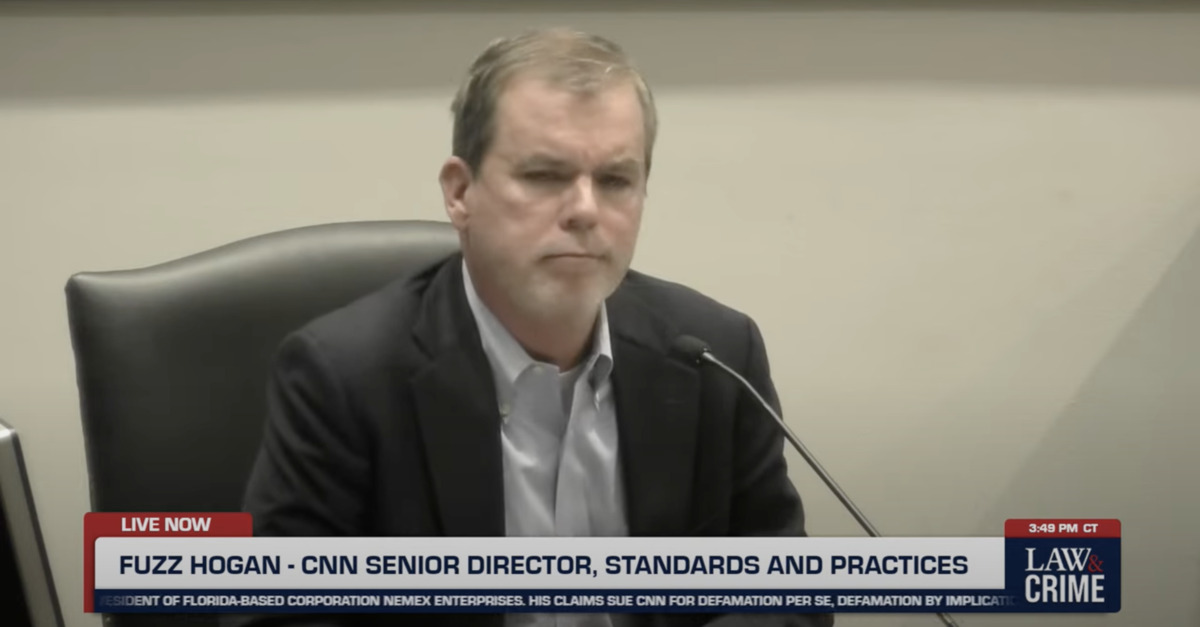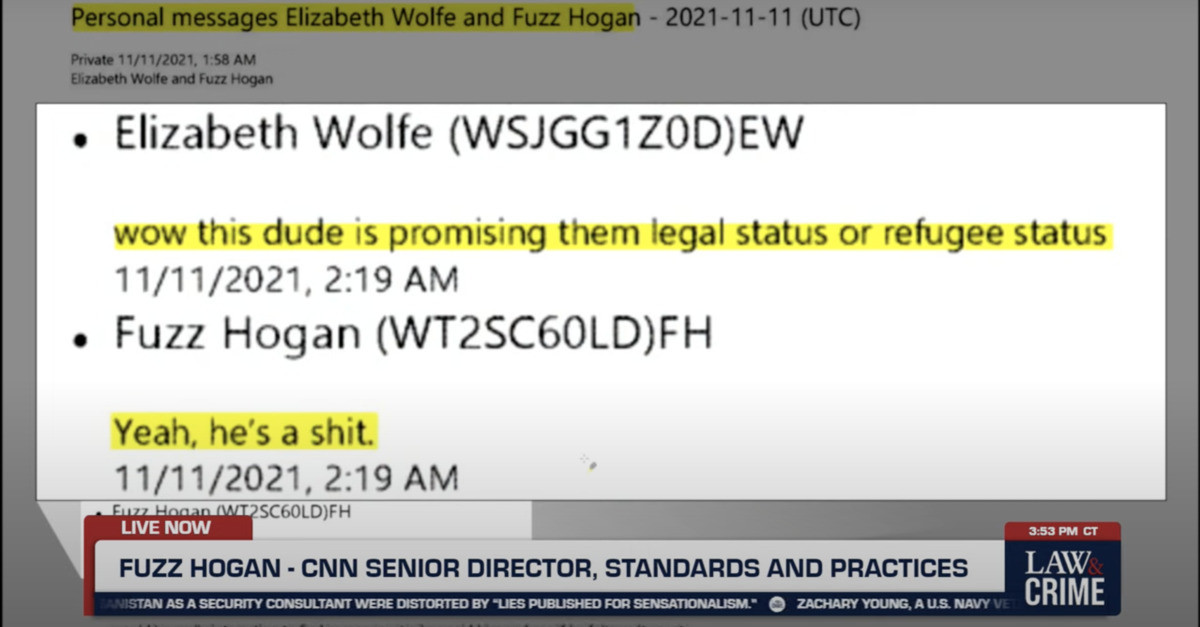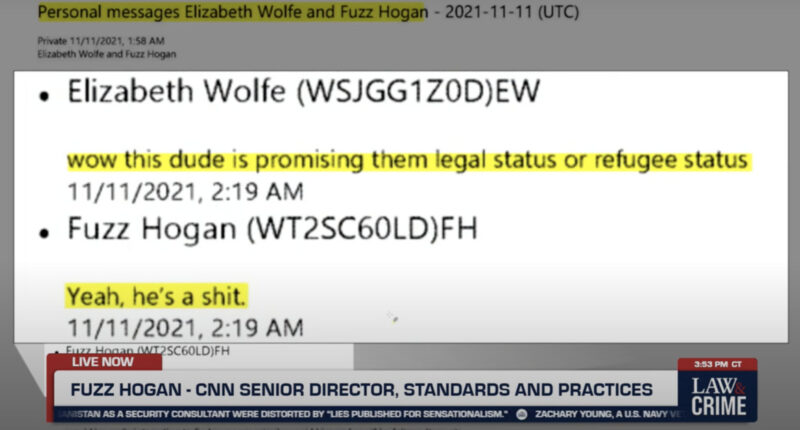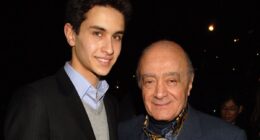
Fuzz Hogan on the witness stand during a defamation trial on Jan. 10, 2025 (Law&Crime).
During the fourth day of the civil trial between a U.S. Navy veteran and CNN, a senior CNN employee became a central figure as the trial unfolded. The veteran claims that the cable news network defamed him in a story concerning his efforts to evacuate individuals from war-torn Afghanistan.
Taking the stand was Fuzz Hogan, who is currently employed as a senior director with CNN’s standards and practices department.
The witness, who was a key player in the unfolding events, was identified as Hogan, who at the time of the broadcast in question, served as a fact-checker. Hogan played a crucial role in verifying the accuracy of the information presented in the story.
The controversial segment in question was part of the November 2021 broadcast of “The Lead with Jake Tapper.” In the lawsuit filed by the plaintiff, it is alleged that CNN misrepresented the veteran, portraying him as an individual engaging in illegal profiteering by charging excessive fees to exploit vulnerable Afghans during the tumultuous U.S. withdrawal from the region.
Young maintains that CNN’s broadcast effectively tarred him as a scofflaw and ruined his business, making it nearly impossible for him to work because of the severe damage to his reputation that ensued.
A major aspect of the plaintiff’s case was always certain to include a circumspect look at how CNN’s employees discussed the story – before, during, and after publication.
On Friday, the final witness of the day offered the Florida jury a substantial degree of insight into some of those inner workings.
“I want to cover some of the things you didn’t know before publishing the story,” Young’s attorney Joe Delich said. “You didn’t know whether Mr. Young successfully evacuated anyone from Afghanistan before you published, right?”
Hogan replied in the affirmative.
“You also didn’t know if anyone at CNN even tried to find out whether Mr. Young successfully evacuated anyone from Afghanistan?” the plaintiff’s attorney asked.
The witness paused, then said: “I’d have to say I don’t know, but I can’t remember those three years ago, but yeah.”
Offered a chance to refresh his recollection, Hogan declined and agreed with Young’s lawyer: “No, it’s fine. I didn’t know. Sure.”
“So, you didn’t know if anyone at CNN even tried to find out whether Mr. Young successfully evacuated anyone from Afghanistan, right?” Delich asked yet again.
To which Hogan replied: “Not to my memory, no.”
Finally, getting to the heart of this line of questioning, Delich pressed on and asked the witness: “And that’s because you didn’t think those things were relevant to the story, right?”
Hogan essayed a puzzled-looking face and replied: “I was a fact-checker then, so my job was to check the facts in the story as asserted. So, I – the facts – the story’s accurate.”
“But you didn’t think it was relevant to the way you reported the story, right?” Delich asked.
The witness responded: “I wouldn’t say it was not, irrelevant, or whatever the word – however you say that. But it wasn’t germane to the text we were – I was improving.”
Young’s attorney then directed the witness to a portion of his deposition.
Hogan read from the document and said he believed his answers were consistent with one another – and then laughed out loud.
Delich kept at this thread and asked again: “So, you didn’t think it was relevant whether anyone tried to find out that Mr. Young successfully evacuated anyone from Afghanistan?”
“I think my line here is consistent with what I just said,” Hogan replied. “In the form that we reported the piece, it wasn’t relevant.”
Attention then turned to an internal CNN discussion between Hogan and editor Tom Lumley about the digital version of the story.
Messages displayed for jurors showed Lumley’s thoughts about the story – penned by Alex Marquardt – in a series of messages to Hogan.
“That Alex story is not poetry in anyway,” Lumley wrote. “I just want to publish something to defuse some drama. I also think it’s half a good story. We should have carried on and reported it out more. Or he should have. I only saw a version at 2pm yesterday. Was not part of the process at all.”
Eventually, Hogan replied to the editor and wrote: “Feels like a good character but he only got 3/4 of the way toward the larger.”
Pressed to account for this response, the witness said his response evidenced some general measure of “agreeable sentiment” but insisted he did not agree with Lumley entirely.
“It’s his job to be an editor,” Hogan said. “He can have opinions about the story that are beyond my role.”
After some back-and-forth, the plaintiff’s attorney elicited testimony that Hogan, in fact, approved the story for publication.
Then Delich moved in for a piece of theater.
He asked: “Mr. Hogan, you approved this 3/4 story about Mr. Young because you thought he was a shit, didn’t you?”
Smiling through his answer as if to shrug off the jab, Hogan replied: “No.”
“Do you deny calling him a shit?” Delich pressed.
Hogan replied: “I don’t.”
Jurors and court-watchers were then treated to a magnified conversation between the witness and CNN reporter Elizabeth Wolfe.
In sum and substance, Wolfe appears to complain about Young’s business pitch for helping would-be evacuees with legal issues. Then, Hogan appears to join in the criticism and supplies the epithet.
The reporter griped: “wow this dude is promising them legal status or refugee status.”
Hogan wrote back: “Yeah, he’s a shit.”

Internal CNN communications shown to jurors during a defamation trial on Jan. 10, 2025 (Law&Crime).
Quizzed about those basic facts of their conversation, the witness answered in the affirmative.
With his wind-up stance thoroughly secured, Delich asked: “And then you went on to approve a 3/4 true story didn’t you?”
“Yes,” Hogan replied.
The plaintiff finished the direct examination of the witness on that note.






